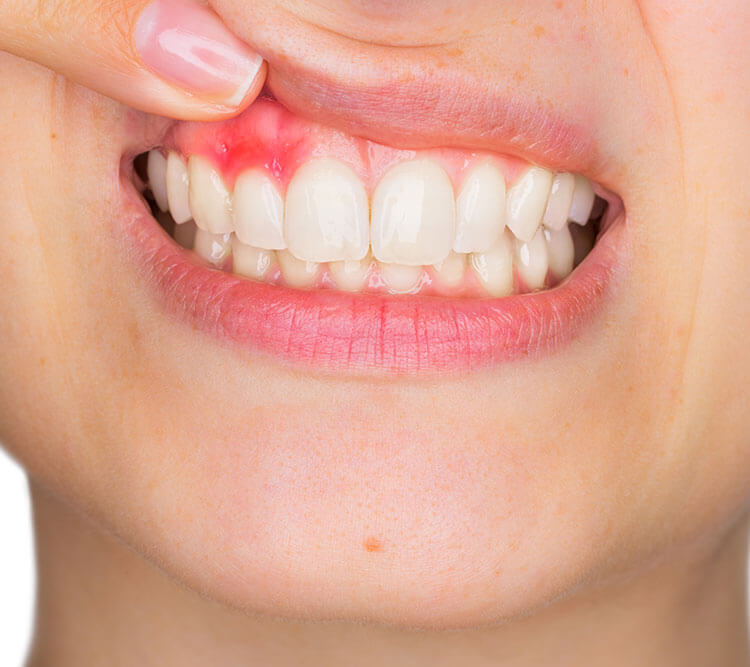Solutions to Common Dental Problems
Sore Gums
Concerned about sore and swollen gums, especially if they bleed?
While you may be focussed on improving the health of your teeth, you cannot afford to get complacent regarding your gums. Your gums are important for both your dental and overall health.
Swollen gums commonly appear where the tooth and gum meet. Sore gums mostly appear red and are sensitive to touch. They may also throb, ache or sting when exposed to certain foods and beverages. Another sign of bleeding after brushing or flossing or even noticing blood after biting into foods such as an apple.
As the gum becomes sore and may swell, you may notice part of the tooth being covered by the inflamed gum. For some an irritated gum may be slightly tender. For others, an irritation may result in a large protrusion between teeth or swelling that spreads across several teeth. This commonly occurs on bottom teeth.
Increased pain and tenderness during brushing and flossing, along with widespread or localised swelling around a single tooth, can be unsettling. Often, there's no visible cause for the discomfort.
Gum tissue is sensitive by its very nature. If your gums get inflamed and irritated, there could be many reasons causing the discomfort.
Whatever your situation, it is important to have your sore and swollen gums checked out.

Causes of Sore Gums
Gum disease is a common cause of sore gums, but various factors may contribute to gum discomfort, including:
- Using a harsh toothbrush.
- Irritating brushing techniques that can damage gums. Opt for a soft-bristled toothbrush, as a hard-bristled one may be too abrasive to tooth enamel and can irritate gums. Brushing in a gentle circular motion is less likely to cause gum irritation.
- Rigorous flossing, which, if too forceful, can damage gums. It's recommended to use a gentle sliding action or try different flossing tools.
- Canker sores and mouth ulcers, which can appear anywhere in the mouth, including the gums.
Other reasons include:
- Underlying health conditions, such as diabetes, deficiency in vitamins B and C, etc.
- Hormonal changes.
- Certain medications.
- Certain dental devices (e.g., braces, dentures). Poorly fitting or deteriorating dental devices can cause gum damage. Maintenance methods, like denture solutions, may also adversely affect gums, causing tenderness, sores, or irritation.
- Teeth that are challenging to clean, such as crooked or impacted teeth.
- Temporary soreness after dental work.
Maintaining good oral hygiene is crucial in preventing gum pain. Regular brushing and flossing help reduce the risk of developing gum disease.
Some of the reasons why you may be experiencing painful, swollen or bleeding gums include:
- poor dental hygiene
- onset of gum disease
- smoking
- medications
- brushing and flossing technique
- hormonal
- pregnancy
- irritation from fitted dental devices such as braces
The best way to keep your gums healthy is by ensuring good oral hygiene practices are maintained. This means:
- flossing daily
- brushing teeth twice a day
- having regular dental check-ups to detect early gum disease
- maintain a healthy lifestyle and nutrition
Removing of plaque and food stuck around your teeth can help stop gums from becoming inflamed, infected and breaking down.
You may be at risk of your gums breaking down and your teeth becoming loose. You may also experience bad breath.
Gum Disease and Sore Gums
You often hear the term gum disease mentioned in relation to the need to maintain good oral hygiene. Gum disease is a term used to describe two gum conditions. Sore gums can be a sign of gum disease.
In its early stage, gum disease presents as gingivitis, a common and less severe condition. Inadequate oral hygiene practices allow food particles and bacteria to linger on teeth, forming a biofilm known as plaque. If not addressed, this plaque accumulates and hardens into tartar (calculus) within a few days. Importantly, tartar buildup cannot be eliminated through brushing and flossing alone, necessitating professional scaling and cleaning.

The consequences of plaque and tartar build-up are significant. Gingivitis may ensue, with tartar acting as a barrier that promotes bacteria collection at the gum line and causes gum irritation. Over time, persistent tartar presence leads to increased build-up and damage to the gums, resulting in inflammation, bleeding gums, gum tenderness, and compromised tooth stability. Left untreated, this condition can escalate, potentially resulting in tooth loss.
Should gingivitis go unaddressed, it can progress to sensitive gums, gum pain, degeneration of gum tissue, and eventually advanced stages of gum disease, known as periodontitis. This stage may involve tooth decay, leading to cavities. Ultimately, extensive dental treatment may be necessary to attempt to save the compromised tooth.
Preventing Sore Gums
The best preventative measure for sore gums is good oral hygiene. That means effective brushing and flossing regularly. Other strategies include:
- eating a well balanced diet
- drinking water
- monitor your stress levels
- have your dental devices regularly reviewed and adjusted if necessary
- regular dental check-up
- have a professional scale and cleaning every 6 months

If you are experiencing tender, sore and or swollen gums, you should not ignore it. There are many reasons for gum inflammation, so having a dental examination will lead to a better understanding and diagnoses of your condition.
To find out more about treating your sore gums, call our friendly staff at Woodville & Seaton Dental Clinic on (08) 8268 5422 or request an appointment online.

